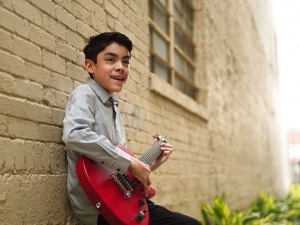A Texas Invention Saves Son’s Life
|
Richie Carrion
Richie Carrion weighed only 1 lb. 15 oz. at birth. Doctors told his parents, Tricia and Ricardo, that Richie had a 50 percent chance of surviving.
It was 2009. Ricardo recalls Richie made one small cry that sounded like a kitten’s cry before he was whisked away to a neonatal intensive care unit. There, he was placed on a breathing apparatus called a neonatal high-frequency ventilator. This ventilator acts as the lungs for a newborn, supplying critical oxygen necessary to live.
“We had a priest baptize him the day he was born,” Ricardo said. “We lived at the hospital for the next four months, praying over him and watching him slowly get stronger. As his health and prognosis improved, I eventually went back to work. I would stay at the hospital in the morning, my dad would watch him in the afternoons, and my wife and I would take the evening shifts. I would often go back to be with Richie around 1 a.m.”
Ricardo is a scientist at Texas Biomed, where he studies vaccines and treatments against the world’s deadliest pathogens. It’s also where the neonatal high-frequency ventilator breathing for Richie was invented and tested in the 1980s and 1990s.
As Richie continued to fight in the NICU, Ricardo continued his critical work in Texas Biomed’s biosafety level-4 laboratory. These labs are rare and specially designed to safely study pathogens with no cures. At the time, Ricardo and collaborators were testing the safety and effectiveness of drugs and vaccines developed by partners against Ebola, Marburg and Lassa Fever. The work then and in the years to follow laid the foundation for Ebola medicines and vaccines now available and saving lives around the world.

While Ricardo sought to protect others from infectious diseases, his son overcame each new challenge he faced. Richie survived several brain bleeds, infections and even a hole in his heart. The neonatal high-frequency ventilator was crucial to his success.
“While I am proud of the work we did on the Ebola vaccines and therapies, and more recently the COVID-19 vaccines,” Ricardo said, “advancements made by Texas Biomed scientists before me in the 1980s and ‘90s are what saved my son’s life. I could not be more grateful.”
Richie is now 13. He plays the piano and guitar, enjoys video games and makes movies. Thanks to research done by scientists in San Antonio, Texas, Richie and millions of other babies born prematurely each year have a better chance at life.
“This is the outcome we hope for every time we step into the lab,” said Ricardo, who is now a Professor and directs Maximum Containment Contract Research at Texas Biomed, “…that the work we do makes a difference in the lives of our friends, loved ones, neighbors and around the world.”
Texas Biomedical Research Institute is a nonprofit 501c3 whose discoveries have improved lives globally and right here in Texas. We depend on your support to continue this lifesaving research. #Stand4Science and donate today at txbiomed.org.
100% of your donation goes to the TxBioMed Capital Campaign
Pilot Project
Science driven by you for you!
As America’s only independent, nonprofit research institute with a fully integrated primate research center and the highest level biosafety laboratories in the world on one campus, Texas Biomed aims to save lives as fast as possible.
Combining its regulated, ethically-run primate center and biosafety labs with the expertise of more than 75 scientists, the Institute is speeding up the development of vaccines and therapies for some of the world’s deadliest diseases.
With a vision to double the size of its workforce, recruit leading scientists in the field of infection and immunity and create a collaborative environment that advances discovery, Texas Biomed is transforming how innovations move from the lab to loved ones. Because, the goal is to eradicate infectious diseases, and give us all a healthier future!